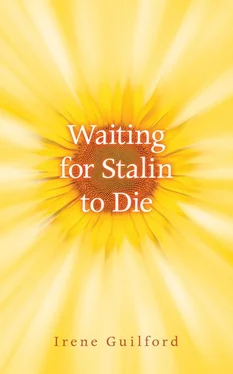“But I need you here,” Jurgis said, his eyes filling with anguish.
“No, you don’t,” she said. “Not the way you used to. You have the church. You have your parish. You have your work. I have nothing. I want my own life.”
“But I need you to help me.”
“Dobilas needs me more.”
He fell silent.
“Besides,” she added, “I really like him and his idiot ways. He makes me laugh. I like being around him. I can be myself.” And he does not judge me, she thought.
His shoulders slumped. Seeing his downcast face, her heart fell, too. Her brother had sat on the edge of her bed, feeding her warm milk while their mother fumed on the other side of the door. He had pulled her to the forest floor, his body covering hers, his hand over her mouth until the soldiers passed. And eyes filling with tears, she moved to embrace him.
“I want to take care of him. The way you have always taken care of me.”
“In that case,” her brother said, wiping away tears of his own, “you must marry. But only if I get to perform the ceremony.”
She hugged him. She would have married Dobilas even without his permission but had the good sense not to say so.
They stood at the sink side by side, doing the dishes. Passing wet plates to Jurgis, she felt the good-natured companionship of a brother who, tea towel in hand, dug her in the ribs at the prospect of becoming a married woman. She would no longer see his smiling face first thing in the morning. She would no longer kiss his cheek last thing at night. And embracing her brother with all her might, she willed into him all the love that she possessed.
Chapter 5

On a cold grey day in November, Father Geras stood by an open grave, saying prayers for the dead. Wind whipping at his robes, missal lying open across his palms, he prayed for the soul of Mrs. Vitkunas. She had breathed her last, eyes shut, mouth open. Then her beating heart was stilled. And early snow swirling about him, he laid to rest the cemetery’s first resident.
Communism had settled upon his country like a heavy cold, a chest cold that nothing could shift and no medicine could despatch. Surging hopes at the news of Stalin’s death had soon faded. A mood of gritty, open-ended resignation had set in. And foreseeing the long homeless future, Father Geras began to plan a more permanent place for his people.
The new cemetery was flat open land, empty but for this first grave, its modest mounds of earth piled on either side. Mourners made a silent rim of grief. They clustered together in the cold. And watched over by three old cedars standing like sentinels by a distant fence, they looked down into the dark chasm into which Mrs. Vitkunas would be lowered.
Leading them in prayer, Father Geras thought of his mother. Friends recently arrived had brought word that she was dead. Will I ever see where she is buried? he thought. Will I ever be able to go down on bended knee and pay my respects? And imagining her buried under a birch tree, grieving her as well as Mrs. Vitkunas, he felt her beating inside his heart.
Father Geras closed his prayer book, resting it against his chest. Squinting off into the distant emptiness, he saw a shimmering vision. A school, a newspaper, a museum. A new church, halls for commemoration and dancing. And seeing a complex of buildings hovering above this new earth, he beheld his life’s work.
They would build on this small patch of land which was now theirs. Working and waiting, keeping hearts and memory alive, they would not forget who they were or where they had come from. They would hope. They would keep faith. And one day, they would go home.
He bowed his head before Mrs. Vitkunas, an old woman who had worked hard, asked little and believed. Returning her bones to the country she had loved, future generations would stand on soil sacred to parents and grandparents, aunts and uncles, brothers and sister and cousins. They would honour those who had left. They would honour those who had stayed. And remembering those who had lived and died, they would honour homeland.
On an April day mild enough for light dresses out of doors, Dobilas and Birute married. Father Geras had invited everyone, saying that after all he had only one sister and how many times would she be getting married. Dr. Prizura was giving away the bride. Steponas was acting as best man. Justine was playing the organ. And Maryte had agreed to be maid of honour.
Guests hurried up the church steps in the spring morning. Passing the bride, they cast smiles of pleasure at the young woman holding one hand to her veil in the light wind while the maid of honour bent to adjust the bridal skirts. Their hearts were uplifted by the festive occasion. They warmed to the two lost souls who had found one another. And rejoicing in the continuation of life and the persistence of happiness, they went inside to take their seats.
Dr. Prizura, standing in the dim coolness just inside the church door and awaiting the bride, looked at his wife Danguole who sat in a pew upfront, his wife whom he did not love. He had hoped to make her happy but could not. Nor did she make him so. They lived in a no-man’s-land of marriage without love. And looking at her sour shifting back, he tried not to think of what did not exist between them.
He thought instead about work, the waiting room filled with patients, the house calls to the elderly, the growing respect at the hospital. He had landed on his feet. He made a substantial contribution to Father Geras’ fund for the new community centre. And accepting Father Geras’ invitation, he sat on the board of the planning committee.
Danguole complained that she saw even less of him. Unable to give her the attention that she wanted, he hoped the children would keep her busy. Work filled his days. Memories walked through his nights. And carrying the emptiness inside him, keeping it close, he had the company of a pain which became a solace.
He turned at the intimate rustling of women’s skirts, facing the door through which Birute was entering. Looking into the bright daylight, he saw a vision in white. He thought of Lidia, his lost love. He saw her eyes. He heard her voice. And offering his arm to the approaching bride, he knew that, while real life surrounded him, the past would always live inside his heart.
Birute, pausing on Dr. Prizura’s arm, looked towards Father Geras waiting at the altar, her brother whom she adored. Priestly though he appeared, missal in hand, sturdy brown shoes and trouser cuffs visible beneath the hem of his white and gold chasuble, he seemed once more just the brother who had scolded her and fed her warm milk from a spoon. You will always be mine, she thought. And tears coming to her eyes, she prepared to walk up the aisle.
She had to admit that she wouldn’t have minded the presence of her mother. A girl needed her mother by her side on her wedding day but she had Maryte, already the finest mother in the world. I’ll be alright now, she wanted to say to her brother, you don’t have to worry about me anymore. And thinking of the freedom she was about to bestow upon him, she felt a sunburst of happiness.
She stood serenely holding a bouquet of calla lilies to her waist. Seeing the lit faces of the guests turning towards her, she smiled in private pleasure. I have a surprise inside of me, she thought. And feeling the mischievous delight at a secret about to be sprung, she heard the wedding march start.
Father Geras, watching his sister move towards him and the altar, recognized that look on her face, Birute, his sister who had been a handful from the moment she was born. Dancing about barefoot on the farm, baiting father and four brothers, she would prance away full of glee. He had been protector and rescuer. Now she would be another man’s concern. And catching the wicked flash of eyes within the clouds of wedding white, remembering the finger in her mouth and the sly smile, he admitted how much he liked her company.
Читать дальше













